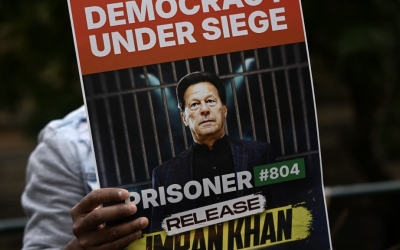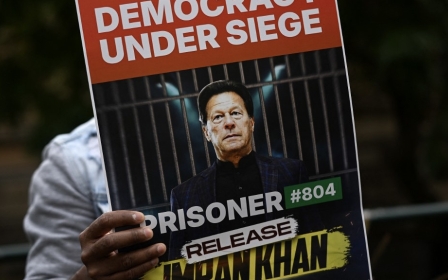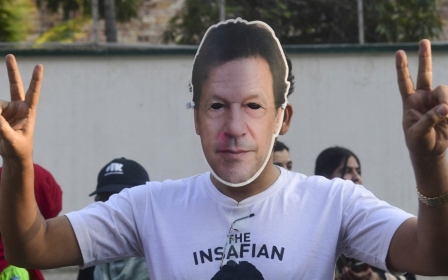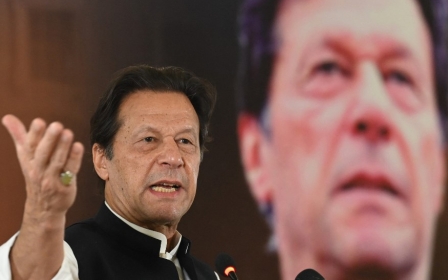Why Pakistan's judiciary may emerge as the saviour of Imran Khan
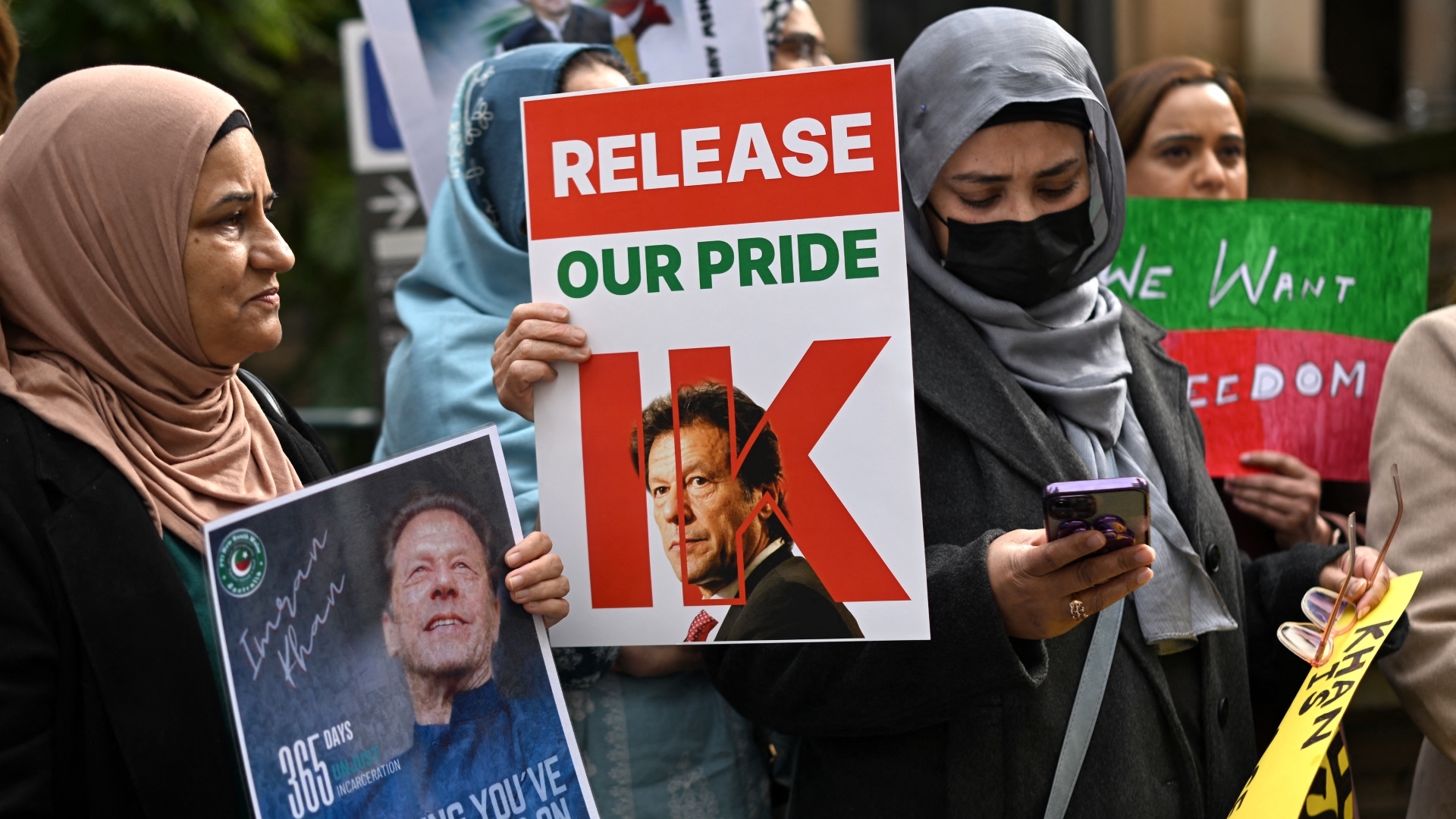
For the past three years, Pakistan's politics has largely become a contest between former prime minister Imran Khan and the country's powerful military aided by its civilian and judicial supporters.
From the very beginning, this power contest has been hugely tilted in favour of the forces opposed to Khan. Yet, by the sheer dint of his personal charisma, populist political discourse, and an unwavering determination not to concede politically, the jailed former leader has managed to remain in the game.
With the judicial flank of the anti-Khan coalition starting to quiver, the political odds have begun to shift.
These developments have compelled the country's governing cadres to intensify the political crackdown against Khan's party, Pakistan Tehreek-e-Insaaf, commonly known as PTI.
In addition to depriving the PTI of reserved seats in parliament, the government has contemplated even more decisive political action, including a political ban on the former premier's political outfit.
New MEE newsletter: Jerusalem Dispatch
Sign up to get the latest insights and analysis on Israel-Palestine, alongside Turkey Unpacked and other MEE newsletters
The 8 February elections were supposed to end the political uncertainty that had plagued Pakistan since Khan's ouster in April 2022. But the country's military establishment did not anticipate the overwhelming support for Khan, which translated into votes across the country.
Khan's party-backed candidate, Yasmin Rashid, a former medical professional and a cancer patient, contested the election from jail and was on the verge of defeating the military's preferred political partner, the supremo of Pakistan Muslim League and Khan's leading rival Nawaz Sharif.
The political earthquake was only stopped by a chaotic late-night rigging of election results that stole victory from Khan's party. This controversial end to the electoral saga and the subsequent formation of a coalition government under Prime Minister Shahbaz Sharif, a close confidant of the country's military, meant that political stability remained elusive.
Legal manoeuvres
In the midst of this bitter political contest was another one playing out between two branches of the judiciary.
Elements within Pakistan's judiciary, led by Chief Justice Qazi Faez Isa, have played an active role in damaging the political prospects of Khan's party.
The delayed scrutiny of electoral fraud gave the newly formed government much-needed legal breathing room to consolidate its grip on power
A Supreme Court ruling barred the PTI from running as a political entity in the elections and from using its cricket bat electoral symbol. This decision by Pakistan's highest court dealt a severe blow to the party's political future, forcing party candidates across Pakistan to run as independents.
It created a judicial rigmarole that effectively ended PTI's chances of entering parliament on its own, let alone forming a government.
In parallel, lower courts have been instrumental in prosecuting Khan on what many have argued are manufactured charges.
While higher courts of appeal have eventually overturned a number of Khan's convictions, this legal process nonetheless prolongs his detention and further limits his political engagement with both party leaders and the public.
Furthermore, despite allegations of election rigging, the courts refused to hear legal challenges by PTI candidates. Instead, they directed petitioners to take their cases to election tribunals that would take more than a year to form.
The delayed scrutiny of electoral fraud helped give the newly formed government much-needed legal breathing room to consolidate its grip on power.
All of this points to the fact that the political containment operation against Khan would have never been possible without support from elements within the judicial fraternity.
The legal cover provided to Pakistan's election commission, its former interim government, and now its current government have played a vital role in sustaining the current political regime.
The election commission's decision to deny PTI-backed independent parliament members their reserved seats for women and minorities - delegating them instead to the ruling coalition - further strengthened the political establishment's pathway towards a two-thirds majority in parliament.
This decision, which had clear political ramifications, was given legal cover by a provincial high court.
Judicial autonomy
For Pakistan's ruling government, it would indeed be ideal for the institutional status quo to continue within the judiciary. However, the country's current chief justice, a critical stakeholder in this power setup, is slated to retire in October.
This development will shake up, and perhaps even lead to the collapse of, the current regime of compliance and cooperation in its higher courts.
Furthermore, the July decision by a 13-member bench of Pakistan's Supreme Court, with an eight to five majority, to restore PTI as a parliamentary party also indicates a potential shift in their stance.
The ruling revealed internal divisions within the court at the institutional level and blocked the chief justice's attempts to deny PTI parliamentary status.
The anti-Khan coalition, therefore, needs an allied judiciary that would continue to provide legal cover for its actions and keep Khan imprisoned. This could only happen if a term extension is granted to the chief justice. The plan, which would require parliamentary approval by a two-thirds majority, has already been discussed within government circles.
However, the strategy of using parliament to manipulate the judicial hierarchy was dealt a blow by the Supreme Court. Visibly shaken by its decision, the government first announced its intention to ban PTI as a political entity due to its alleged role in the 9 May 2023 nationwide riots, which saw crowds angered by Khan's arrest attack various military installations.
The government was forced to back down after realising the possible legal and political repercussions. Its legal minds nonetheless continued to search for ways to deny PTI their reserved seats. In this bid, an election amendment bill was passed from both houses of the parliament, once again restricting the allotment of reserved seats to PTI. It is likely to once again be challenged in the country's superior court.
These developments suggest that the power troika ruling the country and bound by a mutual dislike for Imran Khan and his politics is gradually becoming less cohesive.
The current developments, particularly within the country's judiciary, spell an acceptance of the political mood in the country and a degree of introspection within the ranks of the senior judiciary.
A bigger threat to the current government will be when the judiciary takes speedy and decisive action on cases related to electoral fraud
The Pakistani judiciary's assertion of its institutional independence, especially after the retirement of the current chief justice, could have legal and political implications.
Such a state of affairs may result in the dismissal of cases against Khan and thus pave the way for his release from prison.
A bigger threat to the current government will be when the judiciary takes speedy and decisive action on cases related to electoral fraud during the February elections. Such developments will eventually lead to the demise of the current political order.
However, the country's establishment is not ready to back down as a return of Khan will inadvertently result in the loss of political and institutional capital for establishment ranks.
Political and legal battles within Pakistan are likely to intensify this coming fall and will ultimately decide the future trajectory of the country.
The views expressed in this article belong to the author and do not necessarily reflect the editorial policy of Middle East Eye.
Middle East Eye delivers independent and unrivalled coverage and analysis of the Middle East, North Africa and beyond. To learn more about republishing this content and the associated fees, please fill out this form. More about MEE can be found here.



